Abstract
The human erythrocyte anion-exchange protein (band 3 or AE1) was cloned from a fetal liver cDNA library. Three overlapping clones, encompassing 3637 nucleotides, were analyzed in detail. These encode a 911-amino acid protein (Mr 101,791) and detect a single 4.7-kilobase species in human reticulocyte RNA. The corresponding gene is located on chromosome 17. The protein is similar in structure to other anion exchangers and is divided into three regions: a hydrophilic, cytoplasmic domain that interacts with a variety of membrane and cytoplasmic proteins (residues 1-403); a hydrophobic, transmembrane domain that forms the anion antiporter (residues 404-882); and an acidic, C-terminal domain of unknown function (residues 883-911). The N-terminal domain contains several conserved sections (e.g., residues 57-86, 102-164, 219-347, and 375-403), some of which may contribute to binding sites for ankyrin, protein 4.1, or protein 4.2. The membrane domain is highly conserved with the exception of a single segment (residues 543-567) that contains several sites for cleavage of the protein by extracellular proteases. Based on hydropathy analyses and the wealth of available topographical and functional data, a model is proposed in which the protein crosses the membrane 14 times.
Full text
PDF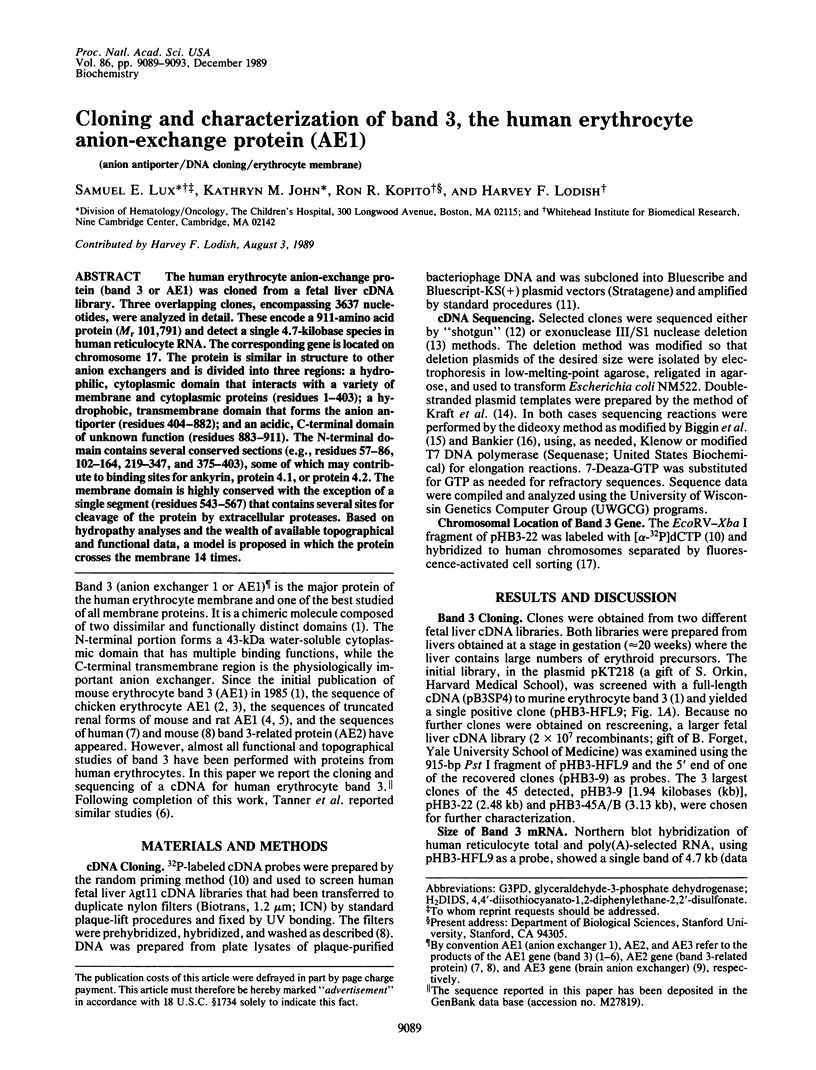
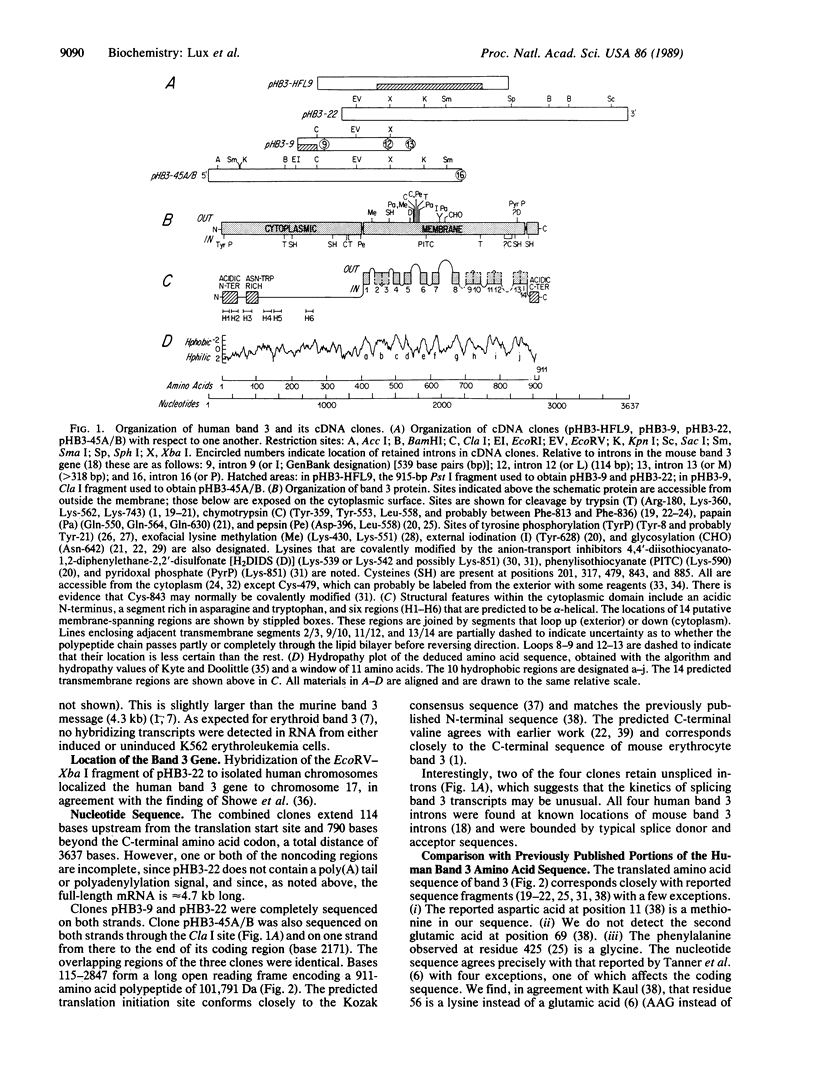
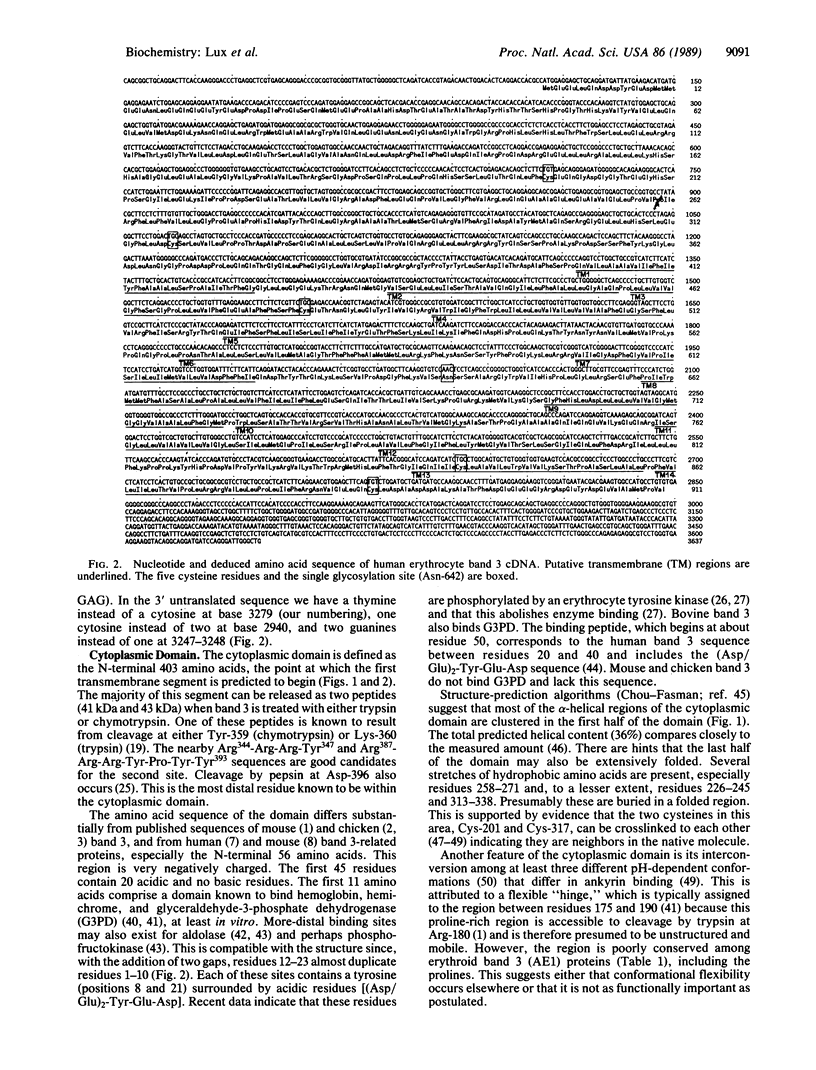
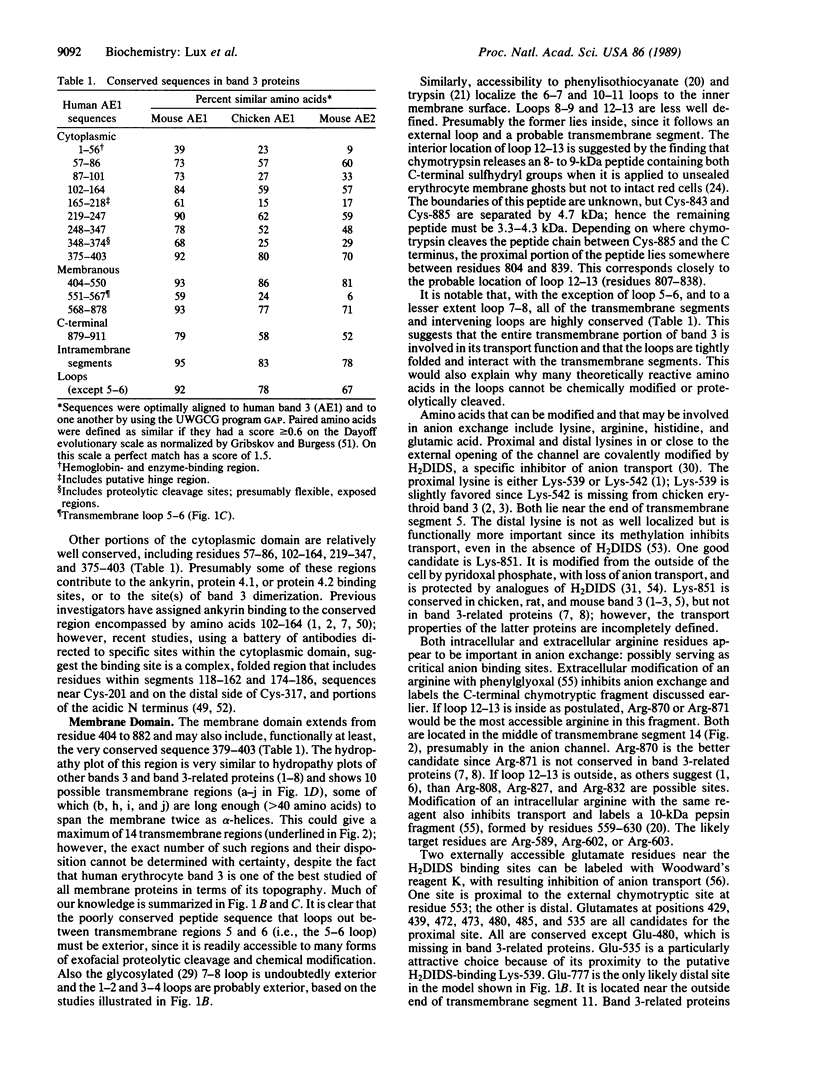
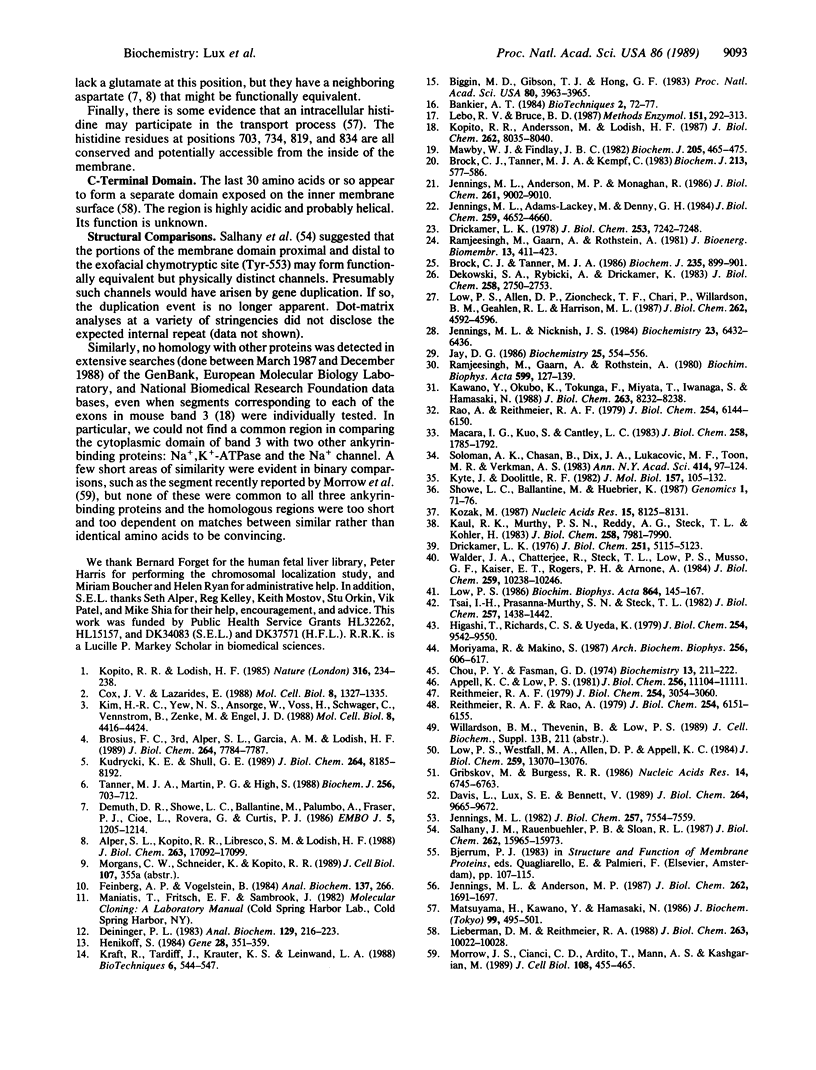
Selected References
These references are in PubMed. This may not be the complete list of references from this article.
- Alper S. L., Kopito R. R., Libresco S. M., Lodish H. F. Cloning and characterization of a murine band 3-related cDNA from kidney and from a lymphoid cell line. J Biol Chem. 1988 Nov 15;263(32):17092–17099. [PubMed] [Google Scholar]
- Appell K. C., Low P. S. Partial structural characterization of the cytoplasmic domain of the erythrocyte membrane protein, band 3. J Biol Chem. 1981 Nov 10;256(21):11104–11111. [PubMed] [Google Scholar]
- Biggin M. D., Gibson T. J., Hong G. F. Buffer gradient gels and 35S label as an aid to rapid DNA sequence determination. Proc Natl Acad Sci U S A. 1983 Jul;80(13):3963–3965. doi: 10.1073/pnas.80.13.3963. [DOI] [PMC free article] [PubMed] [Google Scholar]
- Brock C. J., Tanner M. J., Kempf C. The human erythrocyte anion-transport protein. Partial amino acid sequence, conformation and a possible molecular mechanism for anion exchange. Biochem J. 1983 Sep 1;213(3):577–586. doi: 10.1042/bj2130577. [DOI] [PMC free article] [PubMed] [Google Scholar]
- Brock C. J., Tanner M. J. The human erythrocyte anion-transport protein. Further amino acid sequence from the integral membrane domain homologous with the murine protein. Biochem J. 1986 May 1;235(3):899–901. doi: 10.1042/bj2350899. [DOI] [PMC free article] [PubMed] [Google Scholar]
- Brosius F. C., 3rd, Alper S. L., Garcia A. M., Lodish H. F. The major kidney band 3 gene transcript predicts an amino-terminal truncated band 3 polypeptide. J Biol Chem. 1989 May 15;264(14):7784–7787. [PubMed] [Google Scholar]
- Chou P. Y., Fasman G. D. Conformational parameters for amino acids in helical, beta-sheet, and random coil regions calculated from proteins. Biochemistry. 1974 Jan 15;13(2):211–222. doi: 10.1021/bi00699a001. [DOI] [PubMed] [Google Scholar]
- Cox J. V., Lazarides E. Alternative primary structures in the transmembrane domain of the chicken erythroid anion transporter. Mol Cell Biol. 1988 Mar;8(3):1327–1335. doi: 10.1128/mcb.8.3.1327. [DOI] [PMC free article] [PubMed] [Google Scholar]
- Davis L., Lux S. E., Bennett V. Mapping the ankyrin-binding site of the human erythrocyte anion exchanger. J Biol Chem. 1989 Jun 5;264(16):9665–9672. [PubMed] [Google Scholar]
- Deininger P. L. Random subcloning of sonicated DNA: application to shotgun DNA sequence analysis. Anal Biochem. 1983 Feb 15;129(1):216–223. doi: 10.1016/0003-2697(83)90072-6. [DOI] [PubMed] [Google Scholar]
- Dekowski S. A., Rybicki A., Drickamer K. A tyrosine kinase associated with the red cell membrane phosphorylates band 3. J Biol Chem. 1983 Mar 10;258(5):2750–2753. [PubMed] [Google Scholar]
- Demuth D. R., Showe L. C., Ballantine M., Palumbo A., Fraser P. J., Cioe L., Rovera G., Curtis P. J. Cloning and structural characterization of a human non-erythroid band 3-like protein. EMBO J. 1986 Jun;5(6):1205–1214. doi: 10.1002/j.1460-2075.1986.tb04348.x. [DOI] [PMC free article] [PubMed] [Google Scholar]
- Drickamer L. K. Fragmentation of the 95,000-dalton transmembrane polypeptide in human erythrocyte membranes. J Biol Chem. 1976 Sep 10;251(17):5115–5123. [PubMed] [Google Scholar]
- Drickamer L. K. Orientation of the band 3 polypeptide from human erythrocyte membranes. Identification of NH2-terminal sequence and site of carbohydrate attachment. J Biol Chem. 1978 Oct 25;253(20):7242–7248. [PubMed] [Google Scholar]
- Feinberg A. P., Vogelstein B. "A technique for radiolabeling DNA restriction endonuclease fragments to high specific activity". Addendum. Anal Biochem. 1984 Feb;137(1):266–267. doi: 10.1016/0003-2697(84)90381-6. [DOI] [PubMed] [Google Scholar]
- Gribskov M., Burgess R. R. Sigma factors from E. coli, B. subtilis, phage SP01, and phage T4 are homologous proteins. Nucleic Acids Res. 1986 Aug 26;14(16):6745–6763. doi: 10.1093/nar/14.16.6745. [DOI] [PMC free article] [PubMed] [Google Scholar]
- Henikoff S. Unidirectional digestion with exonuclease III creates targeted breakpoints for DNA sequencing. Gene. 1984 Jun;28(3):351–359. doi: 10.1016/0378-1119(84)90153-7. [DOI] [PubMed] [Google Scholar]
- Higashi T., Richards C. S., Uyeda K. The interaction of phosphofructokinase with erythrocyte membranes. J Biol Chem. 1979 Oct 10;254(19):9542–9550. [PubMed] [Google Scholar]
- Jay D. G. Glycosylation site of band 3, the human erythrocyte anion-exchange protein. Biochemistry. 1986 Feb 11;25(3):554–556. doi: 10.1021/bi00351a006. [DOI] [PubMed] [Google Scholar]
- Jennings M. L., Adams-Lackey M., Denney G. H. Peptides of human erythrocyte band 3 protein produced by extracellular papain cleavage. J Biol Chem. 1984 Apr 10;259(7):4652–4660. [PubMed] [Google Scholar]
- Jennings M. L., Anderson M. P. Chemical modification and labeling of glutamate residues at the stilbenedisulfonate site of human red blood cell band 3 protein. J Biol Chem. 1987 Feb 5;262(4):1691–1697. [PubMed] [Google Scholar]
- Jennings M. L., Anderson M. P., Monaghan R. Monoclonal antibodies against human erythrocyte band 3 protein. Localization of proteolytic cleavage sites and stilbenedisulfonate-binding lysine residues. J Biol Chem. 1986 Jul 5;261(19):9002–9010. [PubMed] [Google Scholar]
- Jennings M. L., Nicknish J. S. Erythrocyte band 3 protein: evidence for multiple membrane-crossing segments in the 17 000-dalton chymotryptic fragment. Biochemistry. 1984 Dec 18;23(26):6432–6436. doi: 10.1021/bi00321a024. [DOI] [PubMed] [Google Scholar]
- Jennings M. L. Reductive methylation of the two 4,4'-diisothiocyanodihydrostilbene-2,2'-disulfonate-binding lysine residues of band 3, the human erythrocyte anion transport protein. J Biol Chem. 1982 Jul 10;257(13):7554–7559. [PubMed] [Google Scholar]
- Kaul R. K., Murthy S. N., Reddy A. G., Steck T. L., Kohler H. Amino acid sequence of the N alpha-terminal 201 residues of human erythrocyte membrane band 3. J Biol Chem. 1983 Jul 10;258(13):7981–7990. [PubMed] [Google Scholar]
- Kawano Y., Okubo K., Tokunaga F., Miyata T., Iwanaga S., Hamasaki N. Localization of the pyridoxal phosphate binding site at the COOH-terminal region of erythrocyte band 3 protein. J Biol Chem. 1988 Jun 15;263(17):8232–8238. [PubMed] [Google Scholar]
- Kim H. R., Yew N. S., Ansorge W., Voss H., Schwager C., Vennström B., Zenke M., Engel J. D. Two different mRNAs are transcribed from a single genomic locus encoding the chicken erythrocyte anion transport proteins (band 3). Mol Cell Biol. 1988 Oct;8(10):4416–4424. doi: 10.1128/mcb.8.10.4416. [DOI] [PMC free article] [PubMed] [Google Scholar]
- Kopito R. R., Andersson M., Lodish H. F. Structure and organization of the murine band 3 gene. J Biol Chem. 1987 Jun 15;262(17):8035–8040. [PubMed] [Google Scholar]
- Kopito R. R., Lodish H. F. Primary structure and transmembrane orientation of the murine anion exchange protein. Nature. 1985 Jul 18;316(6025):234–238. doi: 10.1038/316234a0. [DOI] [PubMed] [Google Scholar]
- Kozak M. An analysis of 5'-noncoding sequences from 699 vertebrate messenger RNAs. Nucleic Acids Res. 1987 Oct 26;15(20):8125–8148. doi: 10.1093/nar/15.20.8125. [DOI] [PMC free article] [PubMed] [Google Scholar]
- Kraft R., Tardiff J., Krauter K. S., Leinwand L. A. Using mini-prep plasmid DNA for sequencing double stranded templates with Sequenase. Biotechniques. 1988 Jun;6(6):544-6, 549. [PubMed] [Google Scholar]
- Kudrycki K. E., Shull G. E. Primary structure of the rat kidney band 3 anion exchange protein deduced from a cDNA. J Biol Chem. 1989 May 15;264(14):8185–8192. [PubMed] [Google Scholar]
- Kyte J., Doolittle R. F. A simple method for displaying the hydropathic character of a protein. J Mol Biol. 1982 May 5;157(1):105–132. doi: 10.1016/0022-2836(82)90515-0. [DOI] [PubMed] [Google Scholar]
- Lebo R. V., Bruce B. D. Gene mapping with sorted chromosomes. Methods Enzymol. 1987;151:292–313. doi: 10.1016/s0076-6879(87)51025-4. [DOI] [PubMed] [Google Scholar]
- Lieberman D. M., Reithmeier R. A. Localization of the carboxyl terminus of Band 3 to the cytoplasmic side of the erythrocyte membrane using antibodies raised against a synthetic peptide. J Biol Chem. 1988 Jul 15;263(20):10022–10028. [PubMed] [Google Scholar]
- Low P. S., Allen D. P., Zioncheck T. F., Chari P., Willardson B. M., Geahlen R. L., Harrison M. L. Tyrosine phosphorylation of band 3 inhibits peripheral protein binding. J Biol Chem. 1987 Apr 5;262(10):4592–4596. [PubMed] [Google Scholar]
- Low P. S. Structure and function of the cytoplasmic domain of band 3: center of erythrocyte membrane-peripheral protein interactions. Biochim Biophys Acta. 1986 Sep 22;864(2):145–167. doi: 10.1016/0304-4157(86)90009-2. [DOI] [PubMed] [Google Scholar]
- Low P. S., Westfall M. A., Allen D. P., Appell K. C. Characterization of the reversible conformational equilibrium of the cytoplasmic domain of erythrocyte membrane band 3. J Biol Chem. 1984 Nov 10;259(21):13070–13076. [PubMed] [Google Scholar]
- Macara I. G., Kuo S., Cantley L. C. Evidence that inhibitors of anion exchange induce a transmembrane conformational change in band 3. J Biol Chem. 1983 Feb 10;258(3):1785–1792. [PubMed] [Google Scholar]
- Matsuyama H., Kawano Y., Hamasaki N. Involvement of a histidine residue in inorganic phosphate and phosphoenolpyruvate transport across the human erythrocyte membrane. J Biochem. 1986 Feb;99(2):495–501. doi: 10.1093/oxfordjournals.jbchem.a135504. [DOI] [PubMed] [Google Scholar]
- Mawby W. J., Findlay J. B. Characterization and partial sequence of di-iodosulphophenyl isothiocyanate-binding peptide from human erythrocyte anion-transport protein. Biochem J. 1982 Sep 1;205(3):465–475. doi: 10.1042/bj2050465. [DOI] [PMC free article] [PubMed] [Google Scholar]
- Moriyama R., Makino S. Interaction of glyceraldehyde-3-phosphate dehydrogenase with the cytoplasmic pole of band 3 from bovine erythrocyte membrane: the mode of association and identification of the binding site of band 3 polypeptide. Arch Biochem Biophys. 1987 Aug 1;256(2):606–617. doi: 10.1016/0003-9861(87)90618-7. [DOI] [PubMed] [Google Scholar]
- Morrow J. S., Cianci C. D., Ardito T., Mann A. S., Kashgarian M. Ankyrin links fodrin to the alpha subunit of Na,K-ATPase in Madin-Darby canine kidney cells and in intact renal tubule cells. J Cell Biol. 1989 Feb;108(2):455–465. doi: 10.1083/jcb.108.2.455. [DOI] [PMC free article] [PubMed] [Google Scholar]
- Ramjeesingh M., Gaarn A., Rothstein A. The location of a disulfonic stilbene binding site in band 3, the anion transport protein of the red blood cell membrane. Biochim Biophys Acta. 1980 Jun 20;599(1):127–139. doi: 10.1016/0005-2736(80)90062-0. [DOI] [PubMed] [Google Scholar]
- Ramjeesingh M., Gaarn A., Rothstein A. The sulfhydryl groups of the 35,000-dalton C-terminal segment of band 3 are located in a 9000-dalton fragment produced by chymotrypsin treatment of red cell ghosts. J Bioenerg Biomembr. 1981 Dec;13(5-6):411–423. doi: 10.1007/BF00743213. [DOI] [PubMed] [Google Scholar]
- Rao A., Reithmeier R. A. Reactive sulfhydryl groups of the band 3 polypeptide from human erythroycte membranes. Location in the primary structure. J Biol Chem. 1979 Jul 10;254(13):6144–6150. [PubMed] [Google Scholar]
- Reithmeier R. A. Fragmentation of the band 3 polypeptide from human erythrocyte membranes. Size and detergent binding of the membrane-associated domain. J Biol Chem. 1979 Apr 25;254(8):3054–3060. [PubMed] [Google Scholar]
- Reithmeier R. A., Rao A. Reactive sulfhydryl groups of the band 3 polypeptide from human erythrocyte membranes. Identification of the sulfhydryl groups involved in Cu2+-o-phenanthroline cross-linking. J Biol Chem. 1979 Jul 10;254(13):6151–6155. [PubMed] [Google Scholar]
- Salhany J. M., Rauenbuehler P. B., Sloan R. L. Characterization of pyridoxal 5'-phosphate affinity labeling of band 3 protein. Evidence for allosterically interacting transport inhibitory subdomains. J Biol Chem. 1987 Nov 25;262(33):15965–15973. [PubMed] [Google Scholar]
- Showe L. C., Ballantine M., Huebner K. Localization of the gene for the erythroid anion exchange protein, band 3 (EMPB3), to human chromosome 17. Genomics. 1987 Sep;1(1):71–76. doi: 10.1016/0888-7543(87)90107-8. [DOI] [PubMed] [Google Scholar]
- Solomon A. K., Chasan B., Dix J. A., Lukacovic M. F., Toon M. R., Verkman A. S. The aqueous pore in the red cell membrane: band 3 as a channel for anions, cations, nonelectrolytes, and water. Ann N Y Acad Sci. 1983;414:97–124. doi: 10.1111/j.1749-6632.1983.tb31678.x. [DOI] [PubMed] [Google Scholar]
- Tanner M. J., Martin P. G., High S. The complete amino acid sequence of the human erythrocyte membrane anion-transport protein deduced from the cDNA sequence. Biochem J. 1988 Dec 15;256(3):703–712. doi: 10.1042/bj2560703. [DOI] [PMC free article] [PubMed] [Google Scholar]
- Tsai I. H., Murthy S. N., Steck T. L. Effect of red cell membrane binding on the catalytic activity of glyceraldehyde-3-phosphate dehydrogenase. J Biol Chem. 1982 Feb 10;257(3):1438–1442. [PubMed] [Google Scholar]
- Walder J. A., Chatterjee R., Steck T. L., Low P. S., Musso G. F., Kaiser E. T., Rogers P. H., Arnone A. The interaction of hemoglobin with the cytoplasmic domain of band 3 of the human erythrocyte membrane. J Biol Chem. 1984 Aug 25;259(16):10238–10246. [PubMed] [Google Scholar]


